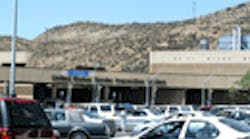According to the agreement announced last week between President Barack Obama and Mexico’s President Felipe Calderon, any Mexican-based truck operating inside the U.S. borders would be required to install an electronic onboard recorder (EOBR). What wasn’t announced at that time, but has since come to light through various published reports is the fact that those EOBR’s will be paid for by the Federal Motor Carrier Administration (FMCSA).
“Well, saying the FMCSA is paying for them is the same as saying American taxpayers are paying for them. If that money comes from the Highway Trust Fund, then it’s even more of an insult to truckers since that money is meant for U.S. highways and is paid into mostly by truckers,” Norita Taylor, spokesperson for the Owner-Operators Independent Drivers Assn. (OOIDA), told Fleet Owner.
While specific details are starting to leak out, based on a “concept document” released by the Dept. of Transportation in early January, any Mexican-based truck would have to meet U.S. safety and environmental regulations, including 2010 emissions. Drivers would also have to know U.S. traffic laws and pass a basic English proficiency test.
(Read industry reaction to the agreement here)
The Obama Administration said the plan, once finalized, would appear in the Federal Register and be open to public comment. It would also be presented to Congress for approval, although that is not necessary, according to a spokesperson for the U.S. Chamber of Congress.
“They don’t need Congressional authorization [to put the agreement in effect],” he pointed out. “The legislative concern is that Congress could act again to proactively bar funding for the program, which is what happened in 2009, leading to the [Mexican] tariffs.”
But the issue of paying for EOBRs is sure to become a sticking point in finalizing an agreement.
“So what is happening is that U.S. truckers are going to have to pay for their own EOBRs, and they are going to have to pay for the ones on Mexican motor carriers as well,” Taylor added, alluding to the fact that FMCSA has proposed requiring the devices for the majority of trucks in the U.S.
(For more on cross-border trucking, click: Fleet Owner’s Special Report: Mexico: A one-way border.)
Peter DeFazio (D-OR), a senior member on the House’s Transportation and Infrastructure Committee, said immediately after the announcement last week that while he is pleased that a deal was reached that would lift $2.4 billion of Mexican tariffs on U.S. goods, he still had reservations about the program.
“I am very concerned that a potential cross-border pilot program will be a one-way ticket for Mexican trucks to come north and threaten the American trucking industry,” he said in a statement. “We can safely bet that American companies won’t go south due to concerns about lawlessness and drug-related crime. If we open our borders to Mexican trucks and give them free range in America, American truckers with a decent family wage will lose work to under- or un-qualified Mexican truckers working for a buck an hour. This could jeopardize hundreds of thousands of American jobs. I eagerly await the opportunity to scrutinize the details of this pilot program and will continue to fight to keep our roads safe and secure, and protect vital American jobs.”



